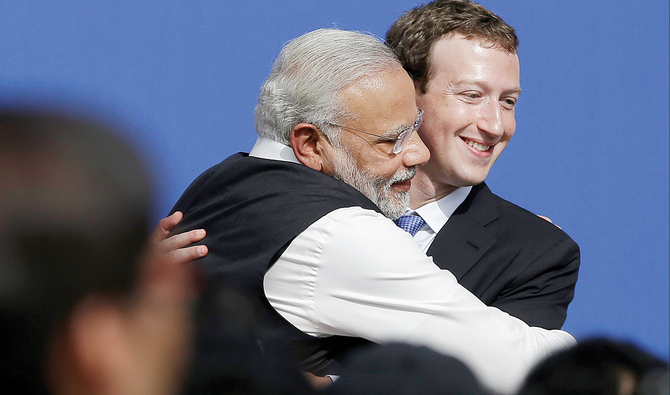NEW DELHI: Facebook was accused Monday of promoting hate speech and destabilizing democracy in India by the country’s main opposition Congress Party.
The social media giant has one of its biggest markets in India, with more than 340 million users.
But a report last week in the Wall Street Journal said the platform had ignored incendiary messages posted by members of the ruling Bharatiya Janata Party (BJP) to protect its business interests.
Facebook did not delete an anti-Muslim video posted by a southern Indian legislator, T. Raja Singh, in March until the newspaper challenged the social network about it.
It added that Facebook India’s public policy executive, Ankhi Das, opposed applying “hate speech rules to Singh and at least three other Hindu nationalist individuals and groups flagged internally for promoting or participating in the violence.”
Das, according to the paper’s report, told employees that “punishing violations by politicians from Modi’s party would damage the company’s business prospects in the country.”
“Across the world, in many countries, Facebook has removed pages citing ‘coordinated inauthentic behavior,’ but why has Facebook never done something similar with rumor-mongering and hate speeches in India?” Congress spokesperson Supriya Shrinate said at a press conference on Monday. “With all responsibility, I will say that Facebook’s inaction destabilizes our democracy. More often than not, Facebook takes no action and, even worse, allows objectionable content to continue despite being brought to notice.”
Facebook denied the accusations, saying that it did not favor any political party in India.
“We prohibit hate speech and content that incites violence, and we enforce these policies globally without regard to anyone’s political position or party affiliation,” it said in a statement to Arab News. “While we know there is more to do, we’re making progress on enforcement and conducting regular audits of our process to ensure fairness and accuracy.”
Congress wants a parliamentary committee inquiry into the issue.
“The Joint Parliamentary Committee (JPC) should examine how Facebook and WhatsApp are working to help the BJP in the elections and to create an atmosphere of hatred,” it said in a statement.
The BJP mocked the opposition’s demand and said the party should “look within itself.”
“It’s ridiculous,” BJP spokesperson Sudesh Verma told Arab News. “If the allegation itself is ludicrous, the demand for the JPC probe would come in the same category. You imagine something and then make a demand. The country does not work on this. If anything, they should approach Facebook. It has given clarifications already. The Congress leadership is frustrated.”
Experts said that the BJP had “weaponized” Facebook and WhatsApp and was using them as a strategy to “mold” public opinion.
“The top brass of Facebook in India are bending over backwards to placate the ruling BJP led by Prime Minister Narendra Modi,” New Delhi-based journalist Paranjoy G. Thakurta told Arab News.
Thakurta co-authored a book last year - “The Real Face of Facebook in India” - that explored how social media was propagating falsehoods in the country.
“Large numbers of Indians have been receiving fake, false, half-truth, inflammatory, incendiary information, and this influenced political preferences in the run-up to the election in 2019,” he said. “They weaponized WhatsApp, and it has become like an army for the rightwing group. Facebook and WhatsApp are not neutral. The playing field is not level. The Wall Street Journal article has highlighted how deep the nexus is between the top officials of Facebook and India’s ruling regime.”
Another New Delhi-based journalist, Urmilesh Urmil, said Facebook was “ideologically- oriented” and favored the ruling right-wing party.
“This is a matter of concern and affects the functioning of democracy in India,” he told Arab News.
In April, Facebook announced plans to invest $5 billion in Reliance Jio, the largest mobile and internet company in India. It is owned by the country’s richest person, Mukesh Ambani.
The deal is expected to give Facebook an even more significant foothold in India.
“The fact that this international global digital giant is tied up with India’s biggest telecommunication provider Reliance Jio means that global monopoly and the local bigwig have come together,” Thakurta added. “I worry how much control and influence these large conglomerates will have in influencing what people read and watch, thereby influencing attitudes and preferences, including their political behavior.”






















